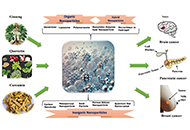-
 Special Issue Topic
Special Issue TopicPotential Clinical Applications of Inorganic Nanomaterials in Cancer
Submission Deadline: February 01, 2025Guest Editor
Prof. Javier Reguera E-Mail
University of Valladolid, Spain
Research Keywords: Nanoparticle synthesis, multifunctionality, biomedicine, surfaces and interfaces, plasmonics, magnetism
About the Special Issue
Cancer remains a leading cause of mortality in current society, with traditional therapeutic approaches often resulting in significant harm to healthy tissues thus with unavoidable side effects. The application of inorganic nanomaterials, which offer a unique platform for targeted drug delivery reducing those side effects, has also opened a new opportunity window to explore new ways in the fight against cancer.
Inorganic nanomaterials present new and unique optical, magnetic, and electronic properties. Thanks to those properties new therapies based on physicochemical stimuli have appeared, for instance, photodynamic therapy, magnetic- and photo-thermal therapies, or magneto-mechanical therapy. The needed co-location of the stimuli and nanoparticle accumulation to produce the therapeutic effect reduce side effects in other organs and healthy tissue. Moreover, those nanoparticles offer excellent contrast capabilities in many imaging techniques (MRI, MPI, CT, US, PAI, etc.) and sensing capabilities (EC, SERS, SEIRA, etc.), which together with the nano-therapies can be integrated into a theragnostic and personalized medicine approach, offering more efficient and reliable results.
This Special Issue aims to advance the following areas:
Synthesis: improved methods for single or multicomponent inorganic nanoparticles, with high control in their morphology, uniformity, surface functionalization, and properties. Those nanoparticles should be aimed at cancer therapies, especially relevant are those that can combine different therapies for synergistic treatments or can combine therapies + diagnosis approaches.
Characterization: progress in physicochemical characterization methods that improve our understanding of how those nanoparticles work in a cancer therapy or diagnosis.
Application: Studies on the performance of those nanoparticles in cancer treatment and diagnosis including in vitro and in vivo studies, applications in 3D models, biokinetics of tumor accumulation, detection of microtumors, etc.
Call for Papers
Published Articles
 Herbal based nanoparticles as a possible and potential treatment of cancer: a reviewOpen AccessReviewCancer is the greatest cause of mortality worldwide. Various drug classes treat various cancers. Nanoformulations made from natural sources are being studied for treating several diseases, including [...] Read more.Roshan Yadav ... Tejpal YadavPublished: January 03, 2025 Explor Target Antitumor Ther. 2025;6:1002285
Herbal based nanoparticles as a possible and potential treatment of cancer: a reviewOpen AccessReviewCancer is the greatest cause of mortality worldwide. Various drug classes treat various cancers. Nanoformulations made from natural sources are being studied for treating several diseases, including [...] Read more.Roshan Yadav ... Tejpal YadavPublished: January 03, 2025 Explor Target Antitumor Ther. 2025;6:1002285
DOI: https://doi.org/10.37349/etat.2025.1002285 -
-
Ongoing Special Issues
-
Completed Special Issues